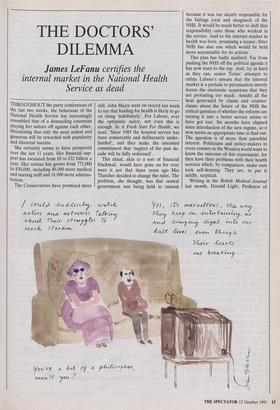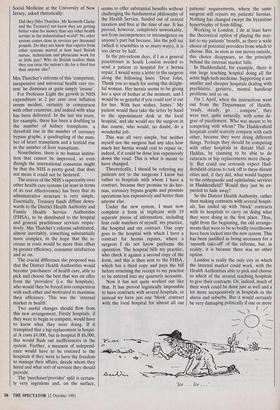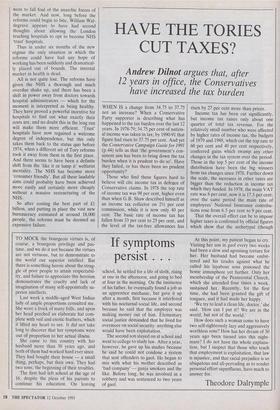THE DOCTORS' DILEMMA
James LeFanu certifies the internal market in the National Health Service as dead
THROUGHOUT the party conferences of the last two weeks, the behaviour of the National Health Service has increasingly resembled that of a demanding courtesan playing her suitors off against each other, threatening that only the most ardent and generous will be rewarded with popularity and electoral success.
She certainly seems to have prospered over the last 11 years. Her financial sup- port has escalated from £8 to £32 billion a year. Her retinue has grown from 773,000 to 830,000, including 40,000 more medical and nursing staff and 18,000 more adminis- trators.
The Conservatives have promised more still. John Major went on record last week to say that funding for health is likely to go on rising 'indefinitely'. For Labour, ever the optimistic suitor, not even this is enough. In A Fresh Start For Health, we read, 'Since 1983 the hospital service has been consistently and deliberately under- funded', and they make the uncosted commitment that 'neglect of the past de- cade will be fully redressed'.
This ritual, akin to a sort of financial blackmail, would have gone on for ever were it not that three years ago Mrs Thatcher decided to change the rules. The problem, she thought, was that central government was being held to ransom because it was too clearly responsible for the failings (real and imagined) of the NHS. It would be much better to shift that responsibility onto those who worked in the service. And so the internal market in health was born, promising a leaner, fitter NHS but also one which would be held more accountable for its actions.
This plan has badly misfired. Far from pushing the NHS off the political agenda it has now risen to the top. And, try as hard as they can, senior Tories' attempts to refute Labour's smears that the internal market is a prelude to privatisation merely leaves the electorate suspicious that they are protesting too much. Amidst all the heat generated by claims and counter- claims about the future of the NHS the critical question of whether the reforms are turning it into a better service seems to have got lost. Six months have elapsed since introduction of the new regime, so it now seems an appropriate time to find out. The question is of more than parochial interest. Politicians and policy-makers in every country in the Western world want to know the outcome of this experiment, for they have their problems with their health services which, by comparison, make ours look self-denying. They are, to put it mildly, sceptical.
Writing in the British Medical Journal last month, Donald Light, Professor of Social Medicine at the University of New Jersey, asked rhetorically: Did they [Mrs Thatcher, Mr Kenneth Clarke and the Treasury] not know they are getting better value for money than any other health service in the industrialised world? No other system comes close in services per thousand pounds. Do they not know that experts from other systems marvel at how hard British nurses, technicians and physicians work for so little pay? Why do British leaders think they can treat the nation's ills for a third less than anyone else?
Mrs Thatcher's reforms of this 'competent, inexpensive and universal health care sys- tem' he dismisses as quite simply 'insane'.
For Professor Light the growth in NHS expenditure at 2 per cent over inflation seems modest, certainly in comparison with other countries, and indeed with what has been delivered. In the last ten years, for example, there has been a doubling in the number of kidney transplants, a threefold rise in the number of coronary bypass graphs, a quadrupling of the num- ber of heart transplants and a tenfold rise in the number of liver transplants.
Nonetheless, there is no human institu- tion that cannot be improved, so even though the international consensus might be that the NHS is pretty good, that does not mean it could not be bettered.
The source of the NHS's superiority over other health care systems (at least in terms of its cost effectiveness) has been that its administrative structure is very simple. Essentially, Treasury funds diffuse down- wards to the District Health Authority and Family Health Service Authorities (FHSA), to be distributed to the hospital and general practitioner services respec- tively. Mrs Thatcher's reforms substituted, almost inevitably, something substantially more complex, in the hope that the in- crease in costs would be more than offset by greater efficiency, consumer satisfaction and so on.
The crucial difference she proposed was that the District Health Authorities would become 'purchasers' of health care, able to pick and choose the best that was on offer from the 'providers' (i.e. the hospitals), who would then be forced into competition with each other and motivated to maximise their efficiency. This was the 'internal market in health'.
Two useful changes should flow from this new arrangement. Firstly hospitals, if they were to begin to compete, would have to know what they were doing. If it transpired that a hip replacement in hospit- al A costs £4,000, but in hospital B £6,000, this would flush out inefficiencies in the system. Further, a measure of independ- ence would have to be restored to the hospitals if they were to have the freedom to manage their affairs, decide whom they hired and what sort of services they should provide.
The `purchaser/provider' split is certain- ly very ingenious and, on the surface, seems to offer substantial benefits without challenging the fundamental philosophy of the Health Service, funded out of central taxation and free at the time of use. It has proved, however, completely unworkable, not from incompetence or intransigence on anyone's part but because, like the poll tax (which it resembles in so many ways), it is too clever by half.
In the pre-reform days, if I as a general practitioner in South London needed to send a patient to hospital for a hernia repair, I would write a letter to the surgeon along the following lines: 'Dear John, Thank you so much for seeing this delight- ful woman. Her hernia seems to be giving her a spot of bother at the moment, and I would be so grateful if you could sort it out for her. With best wishes, James.' My patient would then take the letter by hand to the appointment desk at the local hospital, and she would see the surgeon in due course, who would, no doubt, do a wonderful job.
This was all very simple, but neither myself nor the surgeon had any idea how much her hernia would cost to repair or, indeed, if it could be done less expensively down the road. This is what is meant to have changed.
Theoretically, I should be referring my patients not to the surgeons I know but rather to hospitals with whom I have a contract, because they promise to do her- nias, coronary bypass graphs and prostate operations less expensively and better than anyone else.
Under the new system, I must now complete a form in triplicate with 19 separate pieces of information, including four code numbers of myself, my practice, the hospital and my contract. One copy goes to the hospital with which I have a contract for hernia repairs, where a surgeon I do not know performs the operation. The hospital bills my practice, who check it against a second copy of the form, and this is then sent to the FHSA, which has a third copy and pays the bill before returning the receipt to my practice to be entered into my quarterly accounts.
Now it has not quite worked out like that. It has proved logistically impossible to have contracts with several hospitals, so instead we have just one 'block' contract with the local hospital for almost all our patients' requirements, where the same surgeon still repairs my patients' hernias. Nothing has changed except the byzantine hypertrophy of form-filling.
Working in London, I do at least have the theoretical option of playing the mar- ket to my patients' benefit, as there is wide choice of potential providers from which to choose. But, as soon as one moves outside, this choice disappears, so the principle behind the internal market falls.
In Huddersfield, for example, there is one large teaching hospital doing all the acute high-tech medicine. Supporting it are smaller and cheaper hospitals dealing with psychiatric, geriatric, mental handicap problems and so on.
On 1 April, when the instructions went out from the Department of Health, `ready, steady, go . . . compete', they were met, quite naturally, with some de- gree of puzzlement. Who was meant to be competing with whom? The Huddersfield hospitals could scarcely compete with each other, because they were doing different things. Perhaps they should be competing with other hospitals in distant Hull or Halifax, by claiming to be able to do cataracts or hip replacements more cheap- ly. But could one seriously expect Hud- dersfield citizens to trek off to these distant cities and, if they did, what would happen to the orthopaedic and ophthalmic services in Huddersfield? Would they just be ex- pected to fade away?
So the District Health Authority, rather than making contracts with several hospit- als, has ended up with 'block' contracts with its hospitals to carry on doing what they were doing in the first place. Thus, right from the beginning, the old arrange- ments that were to be so boldly overthrown have been locked into the new system. This has been justified as being necessary for a `smooth take-off' of the reforms, but, in reality, it is because there was no other option.
London is really the only city in which the internal market could work, with the Health Authorities able to pick and choose to which of the several teaching hospitals to give their contracts. Or, indeed, much of their work could be done just as well and a lot more inexpensively in hospitals in the shires and suburbs. But it would certainly be very damaging politically if one or more were to fall foul of the anarchic forces of the market. And now, long before the reforms could begin to bite, William Wal- degrave appears to have had second thoughts about allowing the London teaching hospitals to opt to become NHS `trust' hospitals.
Thus in under six months of the new regime the only situation in which the reforms could have had any hope of working has been suddenly and dramatical- ly placed out of bounds. The internal market in health is dead.
All is not quite lost. The reforms have given the NHS a thorough and much overdue shake up, and there has been a shift in power away from doctors towards hospital administrators — which for the moment is interpreted as being healthy.
They have proved a powerful incentive for hospitals to find out what exactly their costs are, and no doubt this in the long run will make them more efficient. 'Trust' hospitals have now regained a welcome degree of independence, but this only takes them back to the status quo before 1974, when a different set of Tory reforms took it away from them in the first place.
And there seems to have been a definite shift from the 'like it or lump it' welfarist mentality. The NHS has become more `consumer friendly'. But all these laudable aims could probably have been achieved more easily and certainly more cheaply without a massive restructuring of the NHS.
So after costing the best part of £1 billion, and putting in place the vast new bureaucracy estimated at around 18,000 people, the reforms must be deemed an expensive failure.




























































 Previous page
Previous page